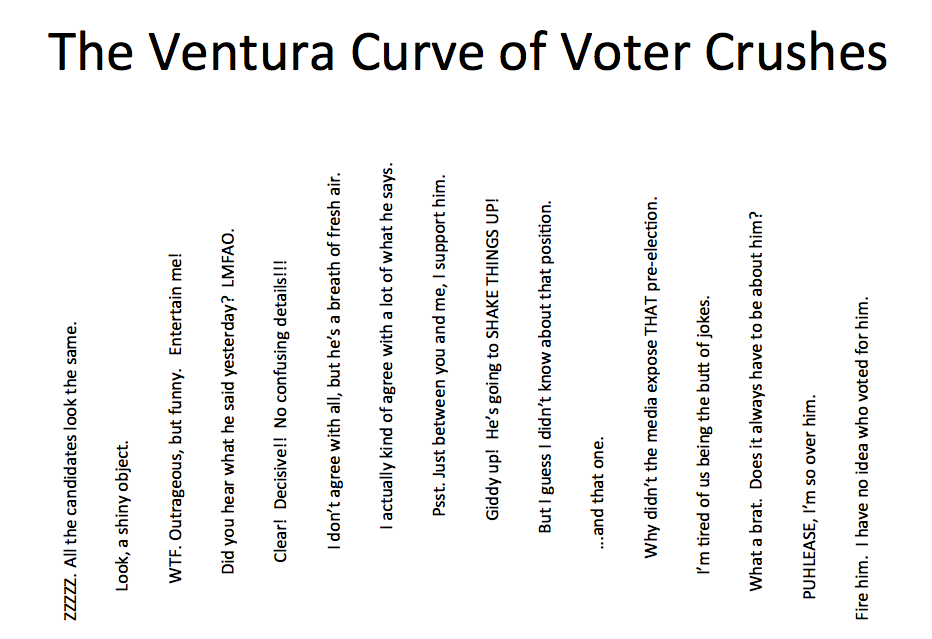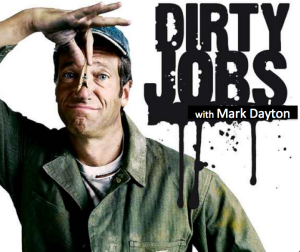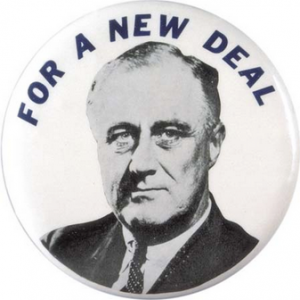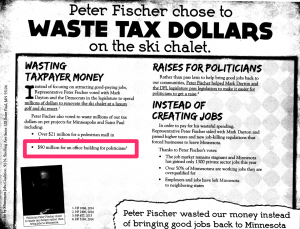With the Trump Bump in full swing, we Minnesotans have an obligation to explain to our fellow Americans how these political crushes work. Been there. Done that.


With the Trump Bump in full swing, we Minnesotans have an obligation to explain to our fellow Americans how these political crushes work. Been there. Done that.

 Governor Mark Dayton is Minnesota’s political version of Mike Rowe, the star of the Discovery Channel television show “Dirty Jobs.” Rowe’s show is all about him taking on difficult, disrespected and grotesque jobs that others avoid, such as being a sewer inspector, road kill scavenger, worm dung farmer, shark repellent tester, maggot farmer, and sea lamprey exterminator. Who knew that worm dung needed farming?
Governor Mark Dayton is Minnesota’s political version of Mike Rowe, the star of the Discovery Channel television show “Dirty Jobs.” Rowe’s show is all about him taking on difficult, disrespected and grotesque jobs that others avoid, such as being a sewer inspector, road kill scavenger, worm dung farmer, shark repellent tester, maggot farmer, and sea lamprey exterminator. Who knew that worm dung needed farming?
Dirty Job Dayton
Governor Mark Dayton may not be farming worm dung, but consider just a few of the filthy tasks Dirty Job Dayton has already embraced in his five year’s in office.
Taxing Most Powerful Minnesotans. Before Dayton, non-partisan analyses were showing that the wealthiest Minnesotans were not paying their fair share of taxes. So Dayton ran for Governor unabashedly championing tax increases on the state’s most wealthy citizens, which earned him some very powerful enemies. At the time, progressive political consultants considered advocating almost any kind of tax increase political suicide for candidates. But Dayton ran on a platform of large tax increases, won a razar thin victory at the polls, and then promptly passed the tax increases into law as promised.
Implementing Unpopular Obamacare. Dayton wasn’t done there. One of his very first acts of Governor was to champion Obamacare, which many politicians were extremely nervous about at the time. In contrast to his fellow Governors in neighboring Wisconsin, Iowa and South Dakota, Dayton embraced Obamacare’s Medicare expansion to cover 35,000 of the most vulnerable Minnesotans. The Governor had Obamacare protesters shouting him down in his announcement news conference, but he let them have their say and stuck to his principles without looking back. As a result of taking on a number of controversial Obamacare implementation tasks, Minnesota now has the second best rate of health insurance coverage of any state (95%).
Resolving Vikings Stadium Quagmire. Then there was the Vikings Stadium debate that had been festering for almost a decade before Dayton came to office. Despite polls showing that subsidizing the stadium was unpopular, Dayton provided active backing for legislation to publicly subsidize the Vikings Stadium. While noting that he is “not one to defend the economics of the NFL,” he plugged his nose and embraced a job he didn’t welcome, but felt was necessary to keep the Vikings in Minnesota and boost a then-suffering construction sector.
Cutting Coveted Social Safety Net. Early in Dayton’s tenure as Governor, he even made significant cuts in state safety net programs, which is one of the very worst jobs any progressive can ever get. Faced with a large budget shortfall, he proposed cutting $950 million in planned spending, told agencies to cut their budgets by up to 10 percent, and cut the state workforce by 6 percent. That work had to leave even Dirty Job Dayton feeing grimy.
Love these positions or hate them — and Dayton himself didn’t relish many of them — no one can accuse Dayton of political timidity.
Dirtiest Job Yet
But this winter, Dirty Job Dayton finally met his Waterloo. With no political allies in sight, he attempted to push through salary increases for state agency commissioners, who are making less than their peers in many other states. Dayton said he “knew there would be negative reaction,” but, as is his habit, he plugged his nose and pushed forward anyway.
How did that go for him? Well, in the last few weeks Dayton learned that attempting to raise bureaucrats’ pay makes shark repellent testing look like a walk in the park.
Fresh off that experience, one might expect that Dayton would now stick to clean, safe, and easy jobs for the remainder of his time in office. But if you believe that, you obviously don’t know Dirty Job Dayton very well.
Next Up: Slinging Asphalt
After the salary increase shellacking Dayton endured, he has already found a new thankless task to champion – fixing Minnesota’s deteriorating roads and bridges. While Republicans want a modest short-term fix funded out of the current budget surplus, that would be much too easy for Dirty Job Dayton. Dayton is attempting to put in place an ambitious decade-long $11 billion solution. Such a long-term fix necessitates a 16 cent per gallon (at current prices) increase in the gas tax. Not surprisingly, the polls are looking a little rough at the moment.
But Dirty Job Dayton doesn’t care. Like Mike Rowe, if the assignment stinks, scares, or stings, he’s in!
Can someone please tell me what Governor Mark Dayton, Al Franken and the DFL Legislature plan to do with another term in office? Because I have no earthly idea.
I know what they have done in the past, and it’s impressive – an improved economy, health care system, and fiscal outlook.
 But progressives are also supposed to lead the way forward. The dictionary says a “progressive” is “a person advocating or implementing social reform or new, liberal ideas.”
But progressives are also supposed to lead the way forward. The dictionary says a “progressive” is “a person advocating or implementing social reform or new, liberal ideas.”
Where is the “new” part? Where is the “advocating” part?
It’s entirely possible that I’m not paying close enough attention, because this campaign season is putting me to sleep. But I can’t discern where these top DFLers propose to take Minnesota.
Does the DFL have a “secret plan” for more progress on any of these issues, like the secret plan President Nixon promised to end the Vietman War? If so, why is it secret? I just finished watching the PBS televention series about the Roosevelts, and I was reminded that Teddy, Franklin and Eleanor reaped political rewards by fearlessly advocating for bold solutions to society’s toughest problems.
Again, Minnesota DFLers have earned reelection. They have a strong record of paying back schools, implementing reforms that have a record 95% of Minnesotans with health insurance, improving tax fairness, increasing the minimum wage, passing marriage equality, funding job-creating infrastructure improvements, delivering all-day kindergarten, and balancing the budget on-time, in a fiscally responsible way. That’s very impressive work, at a time when extreme Tea Party-backed Republicans have offered only mindless obstructionism.
But we live in an impatient “what have you done for me lately” world. To prevent an electoral setback a few weeks from now, DFLers need to fire up their progressive base enough to get them to vote at higher rates than they typically do in non-presidential year elections. And in terms of a bold new progressive way forward, Minnesota DFLers haven’t offered much to fire them up.
– Loveland
Note: This post also was also published by MinnPost.
While Minnesota DFLers controlled state government the past two years, they have done some very constructive things:
That’s a very nice body of work for the DFL to showcase to voters. They should be proud of it.
If DFLers lose control of all or some of state government, it likely will have had to do with environmental factors they can’t change , such as low DFL constituency turnout in a non-presidential election and an unpopular Democratic President. Their policymaking performance will not be their biggest political problem.
 But there is at least one policymaking unforced error that is making things a bit more difficult for the DFL — the DFLers authorization of a new Senate office building.
But there is at least one policymaking unforced error that is making things a bit more difficult for the DFL — the DFLers authorization of a new Senate office building.
The new Senate office building project is nowhere near as wasteful as Republicans claim. It also is nowhere near as necessary as Senate DFLers claim. But one thing is indisputable: The political optics of the project are bad for the DFL during the election season.
 Most voters won’t do a comprehensive financial analysis of whether DFL leaders are doing a good job stewarding their tax dollars. They will judge fiscal stewardship based on an isolated example or two. Republicans are working overtime to make sure that the Senate Office Building is the example voters use to make their judgement.
Most voters won’t do a comprehensive financial analysis of whether DFL leaders are doing a good job stewarding their tax dollars. They will judge fiscal stewardship based on an isolated example or two. Republicans are working overtime to make sure that the Senate Office Building is the example voters use to make their judgement.
The Senate office building works well for the GOP on a political level. First, the building is built for legislators by legislators. On its face, that seems self-serving and arrogant to many voters. Minnesotans don’t take kindly to self-serving and arrogant.
Second, this is not a pole building, and therefore can be made to seem extravagant. The building renderings strike me as modest, responsible and utilitarian, but demagogues are making the Senate office building seem like something akin to Emperor Nero’s Domus Aurea.
The issue is obviously being overblown by Republicans. This project represents only a small fraction of the entire state budget, and the argument for the building is strong, if you actually take the time to study and consider it. But at-a-glance, voters perceive the building to be self-serving and extravagant, and Republicans realize most will voters only consider the issue at-a-glance.
In what is likely to be a close non-presidential election with little room for error, the DFL legislators can’t afford many unforced errors. Choosing this year to build the new Senate office building is one very big unforced political error.
– Loveland
 MinnPost reporter Cyndy Brucato is breaking the blockbuster news that 2010 Independence Party gubernatorial candidate Tom Horner is, gasp, crossing party boundaries to support Republican gubernatorial candidate Jeff Johnson! The reporter breathlessly reports:
MinnPost reporter Cyndy Brucato is breaking the blockbuster news that 2010 Independence Party gubernatorial candidate Tom Horner is, gasp, crossing party boundaries to support Republican gubernatorial candidate Jeff Johnson! The reporter breathlessly reports:
Another leader in the Minnesota Independence Party is gravitating toward support of a Republican statewide candidate. Tom Horner, the Independence Party candidate for governor in 2010, is meeting this week with GOP candidate for governor Jeff Johnson to discuss joining his campaign.
Wow, if that happens, that does sound like huge news!
Unless you pay close attention to politics.
If you do pay close attention to politics, you know that Tom Horner is a long-time Republican staffer, supporter, consultant and pundit. Before Horner spent one year as a right-leaning Independence Party candidate for Governor, he was the head staffer for Republican U.S. Senator Dave Durenberger, has advocated for Republican candidates like Norm Coleman his entire adult life, has long counseled Republicans, and served for many years as the Republican voice on Minnesota Public Radio (MPR) and other news outlets.
In short, for decades Horner has been one of the most visible Republicans in Minnesota. Reporter Brucato is aware of this because she was a lead staffer for Republican Governor Arne Carlson and Norm Coleman. But she mentions none of Horner’s GOP bona fides in the article.
In other words, the real headline here is actually a wee bit less newsworthy. It’s more like:
GOP Activist Reveals That Veteran GOP Consultant Is Supporting A GOPer for Governor
Zzzzzzzzzzzz.
I like and respect Tom Horner a great deal. Though we disagree on many policy issues, Tom is intelligent, has integrity, and Mr. Johnson is lucky to have his policy and PR counsel. But let’s get real. This hardly qualifies as the blockbuster news the reporter makes it out to be.
I support MinnPost relying on a ex-staffers of politicians for opinion pieces. That’s an appropriate role for an ex-staffer. But they shouldn’t rely on ex-staffers from either party for news reporting like this, because their advocacy background naturally calls their objectivity into question.
While the lede was blown way out of proportion, I did find a few things intriguing about the article that left me hungry for deeper reporting. On taxes, Horner says:
“I wasn’t opposed to raising more revenue, but the way the governor went about it is not in the best long-term interest of Minnesota. Just adding fourth tier only reinforces a tax system that isn’t suited to a global market. Maybe we need more revenue but tilt the policy much more to tax consumption and more to reward investment.”
And on health care, Horner says:
“MnSure is where Republicans could play an effective role. It’s good that we’re expanding access and covering children and have a more robust marketplace. Now how do we control the underlying drivers of health care?”
The fact that Tea Party-backed Republican gubernatorial candidate Jeff Johnson may be bringing in a pro-tax, pro-Obamacare consultant for policy advice raises additional questions that were not posed by the reporter:
The answers to those questions would have been informative, and would have qualified as actual news.
– Loveland
A new survey released today finds that Minnesota Republican gubernatorial nominee Jeff Johnson now trails incumbent DFL Governor Mark Dayton by just nine points, 39% to 48%. Johnson, a Hennepin County Commissioner, has never won a statewide race before.
 While the findings are a surprise to some veteran political observers, a closer look provides a clue why the relative political newcomer may be showing so strongly. About 78 percent of likely Minnesota voters who say they are supporting Johnson believe that he is either their co-worker (26 percent), neighbor (21 percent), business associate (17 percent), or relative (14 percent).
While the findings are a surprise to some veteran political observers, a closer look provides a clue why the relative political newcomer may be showing so strongly. About 78 percent of likely Minnesota voters who say they are supporting Johnson believe that he is either their co-worker (26 percent), neighbor (21 percent), business associate (17 percent), or relative (14 percent).
According to U.S. Census data, Johnson is the most common surname in Minnesota, surpassing the ubiquitous Andersons, Olsons, Petersons, and Nelsons in Minnesota’s top five.
Asked of 800 likely Minnesota voters, the survey’s margin of error is minus or plus 3.9 percent.
Note: This post is satirical, false, and not-to-believed, but somehow also feels plausible.